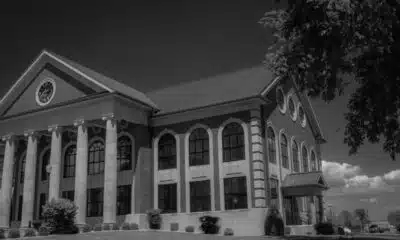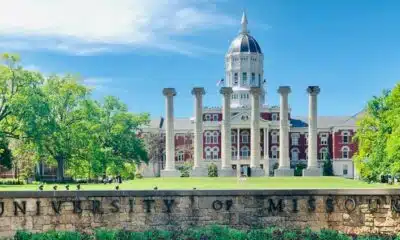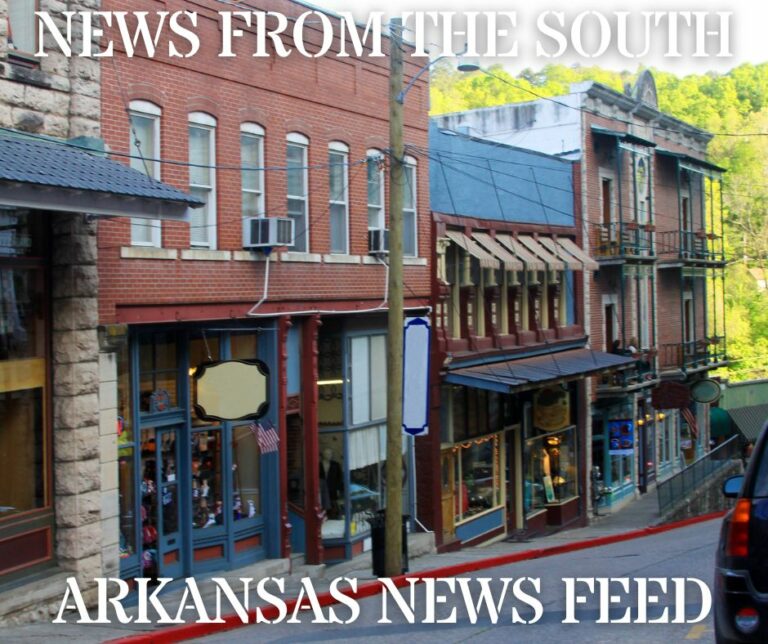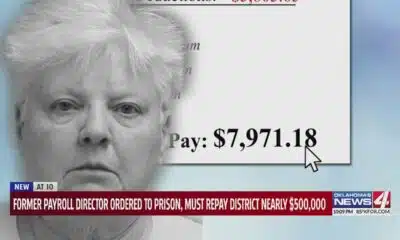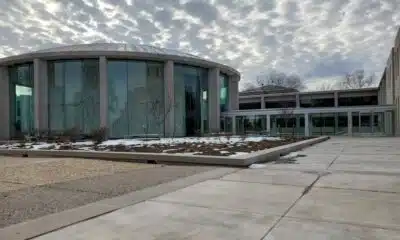News from the South - North Carolina News Feed
Arden Post Office overwhelmed? Waste Pro trash bins at the Buncombe County Landfill? Could Buncombe GIS give traffic alerts? • Asheville Watchdog
Today’s round of questions, my smart-aleck replies and the real answers:
Question: Over the past 10 days, we’ve been getting notices that U.S. Postal Service packages can’t be delivered due to various reasons like, “driveway was blocked,” and “customer requested hold at post office.” These are just not true. When I went into our post office on Hendersonville Road, the Arden Post Office, I was truly shocked. The line was out the door with customers picking up packages. Everyone had similar stories. The post office employees kept blaming Amazon for too many packages and kept saying they were “swamped.” When I say the post office was unorganized, I mean it. Piles of boxes were everywhere. The staff told the customer in front of me to come back in two to three days because they hadn’t sorted the piles and, “we don’t know where your boxes are.” It truly looked like the Whoville post office after the Grinch did his Grinchy thing. I kid you not! It reached a new level this (past) weekend when a medical shipment for my child was left at the post office because “customer requested it be held.” This is simply a lie. They aren’t even trying to deliver packages. Instead they are making up excuses for why they can’t deliver them. This is inexcusable at best. They are holding up medical supplies from reaching customers. This post office has been troublesome for years and everyone in Arden talks about it. But these undelivered packages are a whole new level of irresponsibility. Is there anything you can do to help?
My answer: I’m happy to have a word with the Grinch over a nice Cold Mountain brew at Highland. Also, count me in for singing, “Fah Who Foraze, Dah Who Doraze” when all the whos gather around the Christmas tree.
Real answer: Postal Service spokesperson Philip Bogenberger provided some answers on this one, but I don’t think my reader is going to be fully satisfied.
“Like many Post Offices this time of year, the Arden Post Office is seeing a heavy rise in mail and package volumes, as well as increased customer traffic into Post Offices,” Bogenberger told me. “Still, the Postal Service remains committed to accepting each mailpiece and making every delivery. We are truly appreciative of our team members who are working diligently and efficiently to ensure customers receive their holiday cards and packages by Dec. 25 in addition to delivering non-holiday mail.”
Hey, I appreciate them, too, but I wondered if this building is just too small or they don’t have enough employees. Bogenberger said the Postal Service leases the building.
“There are no plans to relocate at this time, but the Postal Service continually evaluates facilities to ensure they are suitable for operational needs,” he said. “Regarding staff, there were some employees at that office who relocated following Hurricane Helene. During periods of high volumes, we implement contingency plans such as bringing in employees from nearby offices if possible, calling in substitute carriers and hiring seasonal employees. We are committed to delivering every mailpiece.”
In general, Bogenberger said the Postal Service “is more prepared than ever to deliver for the holidays, even as volumes increase to their highest levels.”
“We are processing mail and packages around the clock and our carriers are delivering earlier in the morning and later in the evening.”


Question: Is it true that Waste Pro is taking all the old trash cans to the dump?
My answer: I was kind of hoping this was true just because I’m a fan of irony.
Real Answer: Buncombe County’s new trash and recycling contractor, FCC Environmental, has been issuing new trash bins, and Waste Pro, whose contract ends at the end of the month, has been picking up its containers. But it’s not trashing them at the Buncombe County Landfill, said Johanna Cano, a Buncombe County spokesperson.
I had asked about this at Thursday’s Tropical Storm Helene briefing.
“We followed up with our Solid Waste department regarding your question about Waste Pro bins,” Cano told me. “They are temporarily staging them there. They will be hauled out to other markets for reuse. They are not being dumped at the landfill.”

Question: Buncombe County’s website gives the public access to their Graphical Information System (GIS) maps. Why is there no overlay that shows road blockages and construction/repair locations? This would be useful for planning travel, especially in areas like Fairview where a lot of work is being done. Surely, they must have this information in GIS just for their own planning and record keeping. This should have been up there within the first week of the Helene event. Nearly three months later, still nothing.
My answer: If you just assume that all traffic maps around here are bright red with congestion, no matter what app or website you use, that’s a pretty good bet.
Real answer: Buncombe County spokesperson Kassi Day checked in with the county’s GIS team for this one.
“Buncombe County acquires, develops, maintains, and uses GIS data in support of its internal business functions and the public services it provides,” Day said. “Since Buncombe County does not maintain roads, we do not maintain an overlay that shows road construction, blockages, etc.”
Day said they do recommend residents check the NCDOT website for real-time information on road closures, construction and incidents — drivenc.gov.
“Google, Waze, Apple Maps, etc. are the standards for routing, as those services provide directions, traffic information, and closures, etc., updated automatically by their algorithms and user input,” Day added.
Asheville Watchdog is a nonprofit news team producing stories that matter to Asheville and Buncombe County. Got a question? Send it to John Boyle at jboyle@avlwatchdog.org or 828-337-0941. His Answer Man columns appear each Tuesday and Friday. The Watchdog’s reporting is made possible by donations from the community. To show your support for this vital public service go to avlwatchdog.org/support-our-publication/.
Related
The post Arden Post Office overwhelmed? Waste Pro trash bins at the Buncombe County Landfill? Could Buncombe GIS give traffic alerts? • Asheville Watchdog appeared first on avlwatchdog.org
News from the South - North Carolina News Feed
In Depth with Dan: Answering viewer questions about flesh-eating bacteria, digital licenses
SUMMARY: In this Monday mailbag, Dan addresses viewer questions on three topics. First, North Carolina’s Vibrio bacteria risk in summer coastal waters: cooked shellfish is safe, but raw consumption is risky due to bacteria concentrating in oysters. Second, digital driver’s licenses in North Carolina face delays; although legalized in 2023, full rollout may not occur until 2026, with other states also lagging behind. Lastly, Dan explains flood-damaged vehicles after recent storms: flooded cars must be branded as such, but scams occur. He shares tips to spot flood damage when buying used cars, emphasizing caution and thorough inspection.
WRAL anchor/reporter Dan Haggerty answered viewer questions about a flesh-eating bacteria in North Carolina and the legalization of digital driver’s licenses.
News from the South - North Carolina News Feed
The latest update on Tropical Storm Erin
SUMMARY: Tropical Storm Erin is forecast to become a Category 1 hurricane by Thursday and remain well out to sea through Saturday, near the Lesser Antilles northeast of Puerto Rico. Models show it moving west, then curving north toward Bermuda or Florida, but uncertainty remains high beyond next week. The American and European models suggest it could pass between Bermuda and Hatteras, causing higher surf midweek. Due to large forecast errors, the storm’s exact path is unclear, ranging from north of New York to the Florida panhandle. Residents should prepare hurricane kits and stay updated, with clearer guidance expected by Thursday or Friday.
Will Erin cause problems for the East Coast? Here’s the latest on Monday evening.
https://abc11.com/post/tracking-tropics-tropical-storm-erin-forms-eastern-tropical-atlantic-cabo-verde-islands/17499988/
Download: https://abc11.com/apps/
Like us on Facebook: https://www.facebook.com/ABC11/
Instagram: https://www.instagram.com/abc11_wtvd/
Threads: https://www.threads.net/@abc11_wtvd
TIKTOK: https://www.tiktok.com/@abc11_eyewitnessnews
X: https://x.com/ABC11_WTVD
News from the South - North Carolina News Feed
Body of missing NC teen found in Florida, family says
SUMMARY: The body of missing North Carolina teen Gio Gio was found in Bradenton, Florida, confirmed by his family. Originally, Gio Gio was supposed to be picked up by relatives after meeting cousins in Florida, but he disappeared after texting his mother for help. His family’s private investigators, not the police, discovered his body near I-75 after police had initially searched the area. Gio Gio’s mother expressed her heartbreak on Facebook, calling it every parent’s worst nightmare. The investigation continues, focusing on the timeline after Gio Gio entered the car with his cousins. An autopsy is pending, with no immediate signs of foul play.
The body of Giovanni Pelletier was found in a retention pond, authorities said, and his mom is living “every parent’s worst nightmare.”
https://abc11.com/post/giovanni-pelletier-body-missing-18-year-old-north-carolina-found-pond-where-last-seen-family-says/17483056/
Download: https://abc11.com/apps/
Like us on Facebook: https://www.facebook.com/ABC11/
Instagram: https://www.instagram.com/abc11_wtvd/
Threads: https://www.threads.net/@abc11_wtvd
TIKTOK: https://www.tiktok.com/@abc11_eyewitnessnews
X: https://x.com/ABC11_WTVD
-
News from the South - Oklahoma News Feed3 days ago
Former payroll director ordered to prison, must repay district nearly $500,000
-
News from the South - North Carolina News Feed6 days ago
Two people unaccounted for in Spring Lake after flash flooding
-
News from the South - Tennessee News Feed6 days ago
Trump’s new tariffs take effect. Here’s how Tennesseans could be impacted
-
News from the South - Texas News Feed4 days ago
Jim Lovell, Apollo 13 moon mission leader, dies at 97
-
News from the South - Missouri News Feed5 days ago
Man accused of running over Kansas City teacher with car before shooting, killing her
-
News from the South - Oklahoma News Feed6 days ago
Tulsa, OKC Resort to Hostile Architecture to Deter Homeless Encampments
-
News from the South - Arkansas News Feed7 days ago
Why congressional redistricting is blowing up across the US this summer
-
News from the South - Arkansas News Feed5 days ago
Arkansas courts director elected to national board of judicial administrators








